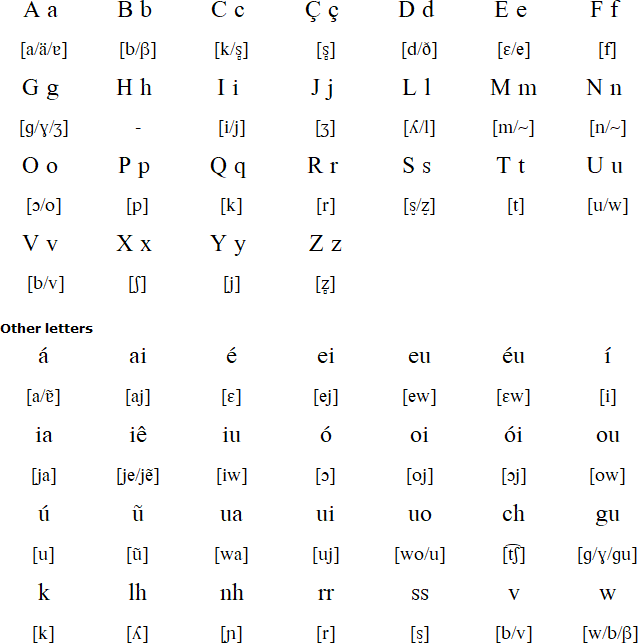Mirandese is a Western Ibero-Romance language spoken by about 3,500 people mainly in northern Portugal. The majority of Mirandese speakers live in the municipalities of Miranda do Douro (Miranda de l Douro) and Vimioso (Bumioso), and also in Mogadouro, , Macedo de Cavaleiros a and Bragança (Bergáncia). There are a few more speakers of Mirandese in Çamora and Salamanca in Spain.
According to a survey carried out by the University of Vigo in 2020, about 1,500 people speak Mirandese regularly, and younger people are less likely to speak the language.
There are three varieties of Mirandese: Border Mirandese (Mirandés Raiano), Central Mirandese (Mirandés Central) and Sendinese (Sendinés). Most Mirandese speakers of also speak Portuguese.
Mirandese is closely related to Asturian, and developed from Astur-Leonese, that was spoken in the Kingdom of León in Spain. It began to emerge as a distinct language during the 12th century, and Mirandese literature first appeared in the late 19th century. The best known Mirandese writer is José Leite de Vasconcelos.
Since Mirandese was first written in 1884, several different spelling systems have been used. The first official orthography appeared in the 1990s, and this has since been changed somewhat.
Today it is taught in some schools, articles in Mirandese appear some in newspapers and magazines, and there are occasional radio and television programmes in the language. Many young people view the language as archaic and underdeveloped and have little interest in it.

Download an alphabet chart for Mirandese (Excel)
Quien dirie qu'antre ls matos eiriçados
Las ourriêtas i ls rius d'esta tiêrra,
Bibie, cumo l chaugarço de la siêrra,
Ua lhéngua de sons tan bariados?
Mostre-se i fale-s' essa lhéngua filha
D'un pobo que ten neilha l choro i l canto!
Nada por ciêrto mos cautiba tanto
Cumo la form' an que l'eideia brilha.
Zgraçiado d'aquel, qu'abandonando
La patri' an que naciu, la casa i l huôrto.
Tamien se squeçe de la fala! Quando
L furdes ber, talbéç que stéia muôrto!
A poem by J. Leite de Vasconcelos, source: http://www.orbilat.com/Languages/Asturian-Mirandes/Texts/Mirandes-Poem.html
Todos ls seres houmanos nácen lhibres i eiguales an honra i an dreitos. Dotados de rezon i de cuncéncia, dében de se dar bien uns culs outros i cumo armanos.
All human beings are born free and equal in dignity and rights. They are endowed with reason and conscience and should act towards one another in a spirit of brotherhood.
(Article 1 of the Universal Declaration of Human Rights)
Muitas lhénguas ténen proua de ls sous pergaminos antigos, de la lhiteratura screbida hai cientos d'anhos i de scritores hai muito afamados, hoije bandeiras dessas lhénguas. Mas outras hai que nun puoden tener proua de nada desso, cumo ye l causo de la lhéngua mirandesa.
Many languages take pride in their ancient scrolls, their centuries-old literature, and in famous writers, today standards of those languages. But there are others which can't boast of any of this, as in the case of Mirandese.
Source: https://en.wikipedia.org/wiki/Mirandese_language#Sample_text
Information about Mirandese | Phrases | Numbers
Information about the Mirandese Language
http://en.wikipedia.org/wiki/Mirandese_language
https://mwl.wikipedia.org/wiki/Lh%C3%A9ngua_mirandesa
https://lhengua.org/lalhengua/
https://clul.ulisboa.pt/en/projeto/border-languages-mirandese
Tradutor Pertués - Mirandés (Portugese-Mirandese translator)
https://student.dei.uc.pt/~crpires/tradutor/Tradutor.html
Aragonese, Aranese, Aromanian, Asturian, Catalan, Corsican, Dalmatian, Emilian-Romagnol, Extremaduran, Fala, Franco-Provençal, French, Friulian, Galician, Gallo, Gascon, Genoese, Guernésiais, Istro-Romanian, Istriot, Italian, Jèrriais, Ladino, Ladin, Ligurian, Lombard, Lorrain, Megleno-Romanian, Mirandese, Moldovan, Monégasque, Mozarabic, Neapolitan, Occitan, Occitan (Auvergnat), Occitan (Languedocien), Occitan (Limousin), Occitan (Provençal), Picard, Piedmontese, Portuguese, Romanian, Romansh, Sardinian, Sicilian, Spanish, Valencian, Venetian, Walloon
Languages written with the Latin alphabet
Page last modified: 12.09.24
[top]
You can support this site by Buying Me A Coffee, and if you like what you see on this page, you can use the buttons below to share it with people you know.

If you like this site and find it useful, you can support it by making a donation via PayPal or Patreon, or by contributing in other ways. Omniglot is how I make my living.
Note: all links on this site to Amazon.com, Amazon.co.uk
and Amazon.fr
are affiliate links. This means I earn a commission if you click on any of them and buy something. So by clicking on these links you can help to support this site.
[top]